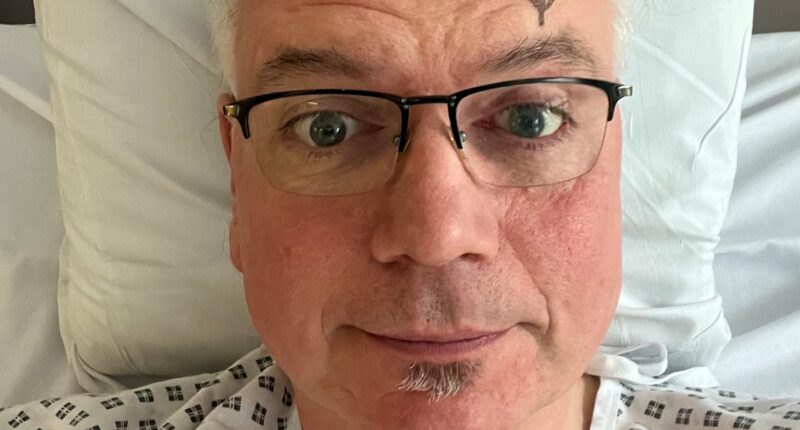Share this @internewscast.com
When Matt Weale visited the optician, the worst thing he expected was to need new glasses. But, to his shock, his check-up revealed he was suffering from severe glaucoma – a common eye condition which can cause blindness, but often goes undetected until the damage has already been done.
Despite more than a dozen procedures, the 54-year-old has been left almost completely blind in one eye – with life-changing consequences.
Forced to quit his job as a travelling sales manager, Mr Weale has described being dizzy, constantly colliding with objects and even seeing things that aren’t there as his brain struggles to compensate for his blurry eyesight.
The father-of-four also believes much of the damage could have been prevented if, after diagnosis, he’d been offered tests on the pressure in his eyes, which would have flagged up his worsening condition.
He said: ‘Glaucoma has affected my life more than I ever imagined. I’ve lost approximately 85 per cent of the vision in my left eye.
‘If I’d been monitored after I was diagnosed doctors could have picked up the deterioration and maybe started treatment earlier.’
An ageing population means more Britons than ever are at risk of glaucoma, and experts now urge everyone – even people who don’t need glasses – to have regular eye checks to improve early detection.
More than half of High Street optometrists saw patients last year who had suffered permanent sight loss due to late detection or delays in treatment for glaucoma, according to new research.

When Matt Weale (pictured) visited the optician, the worst thing he expected was to need new glasses. But, to his shock, his check-up revealed he was suffering from severe glaucoma

Despite more than a dozen procedures, the 54-year-old has been left almost completely blind in one eye – with life-changing consequences
Dr Pete Hampson, clinical director of the Association of Optometrists, which carried out the research, said: ‘It’s frustrating that the NHS is overloaded as there’s so much more we could do to help people avoid devastating damage to their sight.’
Glaucoma affects around 700,000 people in the UK, most of them aged over 50 or with a family history of the disease.
The condition develops when the eye’s drainage system becomes less efficient, causing fluid to build up and put pressure on the optic nerve – which transmits visual information to the brain.
Over time, this pressure damages the nerve fibres, leading to progressive, irreversible vision loss – typically starting at the edges of the visual field and eventually narrowing to tunnel vision.
While the condition is incurable, it can usually be managed using pressure-lowering eye drops, laser therapy or surgery.
Dr Hampson said: ‘Glaucoma is known as the ‘silent thief of sight’ because it’s largely symptomless until it’s quite advanced.
‘Once the damage is done, it can’t be reversed. But if caught early, it can be treated and controlled.
‘That’s why it’s so important for everyone to have regular eye tests, even if they haven’t noticed problems.’

Forced to quit his job as a travelling sales manager, Mr Weale (pictured) has described being dizzy, constantly colliding with objects and even seeing things that aren’t there as his brain struggles to compensate for his blurry eyesight

The father-of-four (pictured) also believes much of the damage could have been prevented if, after diagnosis, he’d been offered tests on the pressure in his eyes, which would have flagged up his worsening condition
Routine eye checks can detect glaucoma early, often using the ‘puff of air’ test – formally known as non-contact tonometry – which measures intraocular pressure.
The test involves a gentle burst of air directed at the eye to assess how much the cornea flattens, allowing optometrists to estimate pressure inside the eye.
For Mr Weale, who lives with his wife in Solihull, tests in 2020 found his right eye was fine – but the pressure in his left was very high.
Immediately sent to the local eye hospital, he was given drops to lower the pressure, then told to expect an appointment in three months. But seven months later, despite chasing the appointment, Mr Weale still hadn’t been seen.
He said: ‘My vision was getting worse. At the top left in my left eye, there were flickering black spots everywhere.’
Eventually Mr Weale paid for a private check-up which revealed the pressure had not gone down but had, instead, continued to rise to dangerous levels.
Doctors tried different medication – and at one stage he was using 30 eye-drops a day. He said: ‘It was so complicated I needed a spreadsheet.’
He later underwent laser treatment, firstly to improve drainage, then to reduce production of fluid in his eye.

Mr Weale (pictured) only found he had glaucoma after his eyesight had begun to deteriorate
When the pressure stayed high he had an operation to create a new drainage channel and insert an extra drainage tube.
Although his glaucoma is now stable, his vision is severely impaired. He said: ‘My right eye’s perfect, but my left is pixelated and blurred.
A double vision effect makes the ground seem to move at a different speed to everything else, making me dizzy and seasick.’
Although Mr Weale’s diagnosis came during the chaos of the pandemic, NHS statistics show patients still face long waits.
Of 59,000 people waiting for specialist eye care in December 2024, a third had waited longer than the official 18-week target.
Dr Hampson said: ‘If the system had worked better, Matt could have accessed pressure tests that would have shown the urgency of his condition, leading to quicker treatment.’
In England, glaucoma is frequently detected by optometrists, but treatment and monitoring is in hospital clinics under specialist ophthalmologists.
The Association of Optometrists is now demanding the NHS in England follow Scotland and Wales in allowing specially trained High Street optometrists to manage lower-risk glaucoma patients.
Dr Hampson said: ‘Hospital clinics are overloaded. There aren’t enough appointments or ophthalmologists.
‘We’re not suggesting optometrists should manage every single glaucoma case, but they could see a large proportion – and it could really help ease the burden on the NHS.’










